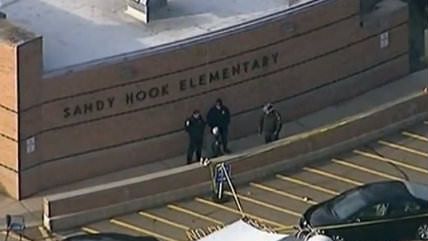Shame On Us If Newtown Panic Leads To Unwise Gun Laws
Most "solutions" wouldn't make us any safer but would make us less free.

On Thursday, flanked by mothers of shooting victims, President Obama sought to evoke the terror and revulsion Americans felt in the aftershock of the Sandy Hook Elementary School shootings.
"We need everybody to remember how we felt a hundred days ago," he said when images of the carnage—six adults and 20 children dead—were painfully fresh in our minds.
Fear and loathing were appropriate reactions to the Newtown atrocity, but they make for a spectacularly lousy mindset for evaluating legislation. Given some of the destructive proposals Congress has entertained post-Newtown, it's good that we've got a little distance on the horror and can bring sober judgment to bear.
Toward that end, it's important to remember that the neighborhood school is one of the safest places your child can be. One estimate, published in the journal Educational Researcher ("What Can Be Done About School Shootings?" January 2010), is that any given school in the United States can expect a school shooting every 6,000 years. But because these incidents are so rare they're also hard to predict and prevent.
Even supporters of the president's gun control package all but concede that universal background checks wouldn't have seriously inconvenienced accused killer Adam Lanza. California Deomocratic Sen. Dianne Feinstein's dead-in-the-water assault weapons ban would have deprived him of the Bushmaster rifle he used but not the Glock and SIG Sauer handguns he also had.
On Thursday, Obama warned of "powerful voices on the other side that are interested in running [out the] clock," hoping "people will just forget about it."
Was the president referring to the National Rifle Association? Has he listened to Wayne LaPierre lately? The NRA head opposes new gun laws, but he's otherwise been the president's partner in panic, breathlessly demanding an "armed good guy" in every school—a federally funded expansion of "America's police force."
Actually, America doesn't have a police force, though LaPierre seems willing to abandon the 10th Amendment to save the Second. If you wanted to spend more than $5 billion to hire 100,000 new cops, it would be silly to put them in schools, where only about 2 percent of youth homicides occur.
New Jersey Gov. Chris Christie had the properly conservative reaction to LaPierre's idea: "You don't want to make [school] an armed camp for kids."
As the Educational Researcher study notes, public fear in the wake of Columbine and other school shootings in the 1990s gave us "active shooter" drills and a proposal for "Kevlar-coated textbooks" that kids could use as shields.
The authors warn that "exaggerated perceptions of risk" spur "ineffective policies such as zero tolerance that do little to create a sustainably safe and secure learning environment."
Stories from around the country indicate that many schools are again needlessly frightening students by making them rehearse responses to mass murder, and zero tolerance is on the rise again.
A Colorado second-grader was recently suspended for "throwing" an imaginary hand grenade, and a Maryland 6-year-old got tossed for pointing his finger like a gun.
Sen. Barbara Boxer (D-Calif.) seems bent on making the problem worse with a bill for federal funding of "surveillance equipment, secured entrances and other important safety measures" at schools and another bill that would encourage governors to call out the National Guard to protect schools.
"Shame on us if we've forgotten" the victims of Newtown, the president intoned Thursday. Fair enough—but shame on us as well if we allow Newtown to spur a legislative panic that leaves us no safer and considerably less free.
This article originally appeared in The Washington Examiner.


Show Comments (94)